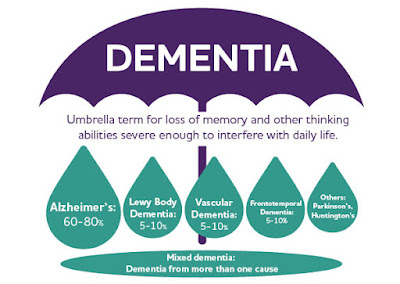Many aging seniors fear getting dementia, even more than they fear dying. In fact, Alzheimer's Disease and other forms of dementia are two of the most popular health searches on Google. Although we all want to avoid slowly losing our memories and our connection to our loved ones, many people are not aware of what activities actually increase their dementia risk, and what changes they could make in their lives to lower their risk. Fortunately, there are steps we can all take which will make us more likely to retain our mental capacity for years longer. The first step is knowing some of the common causes of dementia, and how you can avoid them.
What is Dementia?
Dementia is an umbrella term for all types of memory loss and cognitive decline, including Alzheimer's Disease, vascular disease, Lewy Body dementia, Parkinson's dementia, and other illnesses. Because there are so many different types of dementia, there are also a wide variety of activities which can speed up the process. On the other hand, if we avoid certain behaviors and activities, we may be able to slow down the process enough that we retain our cognitive function for all of our life.
After reading the suggestions below, if you want more details on how to avoid dementia, you might try reading the book: "The End of Alzheimer's: The First Program to Prevent and Reverse Cognitive Decline." (Ad)
Dementia Causes We Cannot Avoid
Of course, there are some things which contribute to dementia which we cannot avoid. The older we are, the more likely we are to have some cognitive decline. In fact, about one-third of people over the age of 85 have signs of Alzheimer's Disease, and the percentage increases as they get older. In addition, certain conditions tend to be genetic and we cannot change the genes we have inherited from our ancestors.
Even though we cannot change our genes or avoid getting older, it is still possible to change our behavior so these factors have less of an effect on our brains. It is possible for many of us to reach extreme old age without serious cognitive decline, but the sooner we start, the more likely we will be able to save our brains from damage.
Risk Factors for Dementia
According to WebMD, there are a number of behaviors and health conditions which increase our dementia risk. The more we do to improve our general health, the more we are also doing to reduce our dementia risk. Here are some specific issues they emphasized:
Heart Disease and Strokes - Anything which increases our risk of heart disease, such as using tobacco, developing diabetes, or allowing high blood pressure and cholesterol to go untreated, will also increase our dementia risk. A stroke, in particular, can cause serious damage to our brain. It is important to follow our doctor's recommendations to avoid having a stroke and, if you have already had one, it is important to be even more aggressive in preventing another one. Anything which is good for the heart is good for the brain. Anything which damages the heart, also damages the brain.
Diabetes - Diabetes can damage our blood vessels, and that can reduce the blood flow to our brains. The reduced blood flow can lead to vascular dementia. It is very important to keep your diabetes under control with a healthy diet, exercise and medications.
High Blood Pressure and Cholesterol - Letting these conditions go untreated makes you more likely to develop either vascular dementia or Alzheimer's Disease. It is important to follow the instructions of your doctor so these conditions do not damage your blood vessels. Get annual checks of your cholesterol levels, and monitor your blood pressure regularly at home. Contact your doctor if it gets too high. If you are given medication, be sure to take it regularly.
Depression - Researchers have not determined whether depression causes dementia or if dementia is an early symptom of certain types of dementia, such as Parkinson's Disease or Huntington Disease. If you are depressed, talk to your doctor and see a therapist, if recommended. In addition, taking medication for your depression may help. Unfortunately, sinking into depression makes it less likely that you will take care of your general health, so depression definitely increases your dementia risk.
Head Trauma - Not all head trauma can be avoided. For example, if you are in an automobile accident or a weather disaster, you may not be able to avoid injuring your head. However, if you have played in a rough, physical sport or engaged in high impact activities which caused your head trauma, you could have up to four times the dementia risk later in life. No matter your age, it is important to seek medical attention immediately for a serious head injury, especially if you pass out or experience blurry vision, dizziness, confusion or nausea. An untreated concussion as a teenager could result in an increased dementia risk later in life.
Obesity - Few people realize that there could be a correlation between being overweight in middle age and having dementia later in life. Talk to your doctor or join a healthy weight loss program in order to get your weight under control. In addition to reducing your dementia risk, losing weight could also lower your risk of heart disease and cancer.
Poor Sleep - Do you brag about being able to get by with very little sleep? Unfortunately, this could increase your dementia risk later in life. If you do not sleep well, try to avoid alcohol, caffeine and the use of electronic devices in the evening. If this does not help, speak with your doctor before using sleep aides. You may need to be treated for sleep apnea, which also increases your heart attack risk and your risk of dementia.
Tobacco Use - Smoking and other tobacco use can increase your risk of a stroke and vascular dementia. It can make it harder to think or remember past events. The sooner you stop the tobacco use, the more your brain will benefit.
Poor Diet - If your favorite meal is a big steak or giant hamburger, you might want to reconsider. Instead, check out the MIND Diet for Beginners, (Ad) which is very similar to the heart-healthy Mediterranean Diet. This book will get you started on a healthier lifestyle which could significantly help you postpone many types of dementia. Eating more whole grains, fruits, nuts, avocados and olive oil can significantly reduce your dementia risk.
Sedentary Lifestyle - If you want to avoid dementia, it is important that you keep moving as much as possible throughout your life. Whether you like brisk walking, dancing, gardening, or just doing housework, the more you move, the lower your dementia risk. You should try to get at least 30 minutes of exercise a day.
Lack of Brain Stimulation - The more you learned as a child and young adult, the lower your dementia risk later in life. However, it is not necessary to have a formal education in order to stimulate your brain. Become a lifelong learner. Read books. Learn new skills. Play games which require some thought. Do crosswords and other puzzles. The more your stimulate your brain, the lower your dementia risk. Want a book to start with? Try reading "The End of Alzheimer's: The First Program to Prevent and Reverse Cognitive Decline." (Ad) It could help you avoid dementia in even more ways!
Are you contributing to your dementia risk? The good news is that it probably is not too late to turn things around. Take action now!
* * * * * *
 |
| Order from deborahdiangifts.etsy.com |
Looking for a gift for yourself or a fellow retiree? Perhaps you have an adult child or grandchild kand would like to celebrate a special event in their life. Give them this lovely pendant. The card in the gift box can even be personalized with your own special message. Just send me a message in my Etsy shop, DeborahDianGifts.etsy.com and I will work with you to make a lovely gift for them!
http://www.etsy.com/shop/DeborahDianGifts
Enjoyed this post? Never miss out on future posts by following us. You will receive one weekly email containing the most current post.
If you are interested in learning more about financial planning, Social Security, Medicare, where to retire, common medical issues as you age, travel and more, use the tabs or pull down menu at the top of the page to find links to hundreds of additional helpful articles.
Disclosure: This blog may contain affiliate links. If you decide to make a purchase from an Amazon ad, I'll make a small commission at no extra cost to you.
You are reading from the blog: http://www.baby-boomer-retirement.com
Photo credits: Google Images Alzheimer's Association, deborahdiangifts.etsy.com









